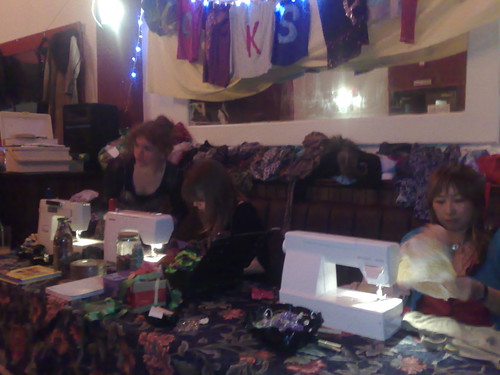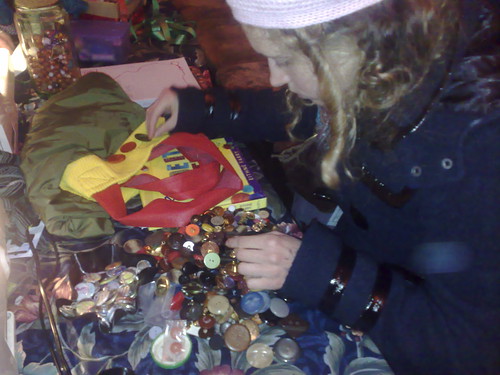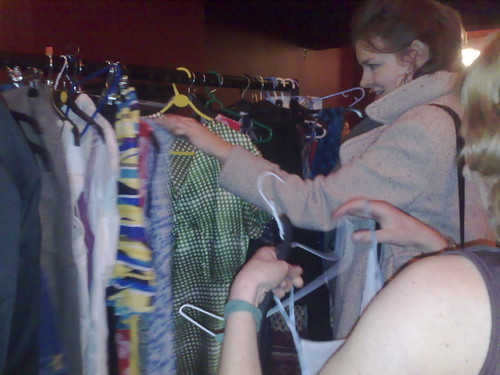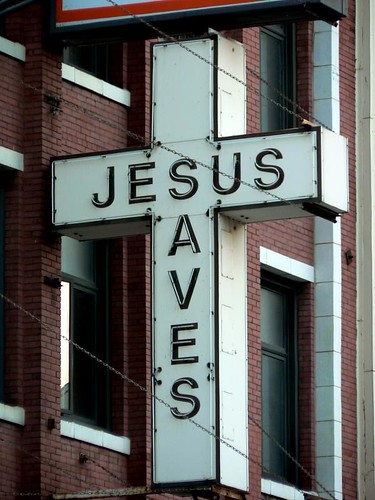I de-fected to Wordpress. Sorry.
I write about fashion and the environment and stuff.
Go, Go, Go
Sunday, 8 March 2009
Tuesday, 13 January 2009
Recycling in Cardiff gets Re-vamped
When Cardiff's food waste recycling packs arrived on the city's doorsteps in October 2008, it was hailed as a breakthrough in sustainable city living. But Rebecca Clark, 26, wasn’t buying the hype. “The scheme is great but it’s not enough,” she says. “You can send people the boxes, bags and leaflets on how to use them, but it doesn't mean they're going to read them. How many people just put everything in their cupboards and forgot about it? More needs to be done to reach those people.” Frustrated at the Council’s approach, she took matters into her own hands and embarked on an ambitious plan to educate the city about green living – beginning with the fickle world of fashion.
Rebecca staged Re-Vamp, the city’s first ever large-scale clothes swapping and customisation event, as an antidote to the 'Fast Fashion' phenomenon. Cheaply-produced, poorly-made, stack-‘em-high-sell-‘em-low garments sold by the likes of Primark encourage wastefulness in shoppers. With textiles now making up over 1% of the 330 million tonnes of waste the UK produces every year, Re-Vamp’s first event in November 2008 aimed to educate people about recycling and also featured ‘pedal-powered bingo’ to demonstrate renewable energy.

Rebecca staged Re-Vamp, the city’s first ever large-scale clothes swapping and customisation event, as an antidote to the 'Fast Fashion' phenomenon. Cheaply-produced, poorly-made, stack-‘em-high-sell-‘em-low garments sold by the likes of Primark encourage wastefulness in shoppers. With textiles now making up over 1% of the 330 million tonnes of waste the UK produces every year, Re-Vamp’s first event in November 2008 aimed to educate people about recycling and also featured ‘pedal-powered bingo’ to demonstrate renewable energy.

“My friends and I are quite environmentally aware and often meet up to swap clothes and customise them together,” she says. “Then one day I just thought ‘Why not do this on a larger scale?’” The first event, held in November 2008, was bigger than she ever imagined – over 200 people attended and between them swapped over a thousand garments, all of which may well have ended up on a landfill site otherwise. “We’re still a materialistic society, which is why it was so successful – people like getting clothes for free. But I think we can exploit this to teach people about changing their lifestyles.”
Several organisers took on seamstress roles at the event, demonstrating how to adjust and customize garments, and a ‘Re-vamped fashion show’ was staged featuring a variety of exotic outfits crafted from second-hand fabrics. Rebecca is a believer in the power of actively demonstrating sustainable living - something she feels is missing from current education schemes. “It’s not enough to simply lecture people about recycling, you have to show them how to do it,” she states.
Helen Smith, 26, who assisted with the workshops at the event, agrees that education needs to improve. “It’s really simple to re-use and customise fabrics, but people don’t have the skills to do this,” she says. Helen runs her own environmentally-friendly accessories label, Recycled With Love, but is quick to point out that recycling alone isn't enough. “It’s great to recycle waste, but we shouldn’t actually be producing such a volume of waste in the first place! Everyone’s lifestyles need to change dramatically. Education needs to start early on.”

A council spokesman claimed they already have schemes in place for recycling education. “We run roadshows and do door-to-door visits, but beyond this there’s little we can do. No fines exist for people who fail to recycle, as is the case in other countries, so people should take this issue up with central government,” they stated. But Rebecca is is unsure if fines alone are the answer. “We should give people an incentive rather than a punishment. People think it's difficult and a chore to be sustainable, but that's not true.”
Rebecca now plans to use Re-vamp as a springboard for bigger schemes. “I worked for a solar-powered café at various festivals over the summer and was really inspired by their work,” she says. “We want to build bigger and more varied workshops, not just on clothes but on all angles of sustainable living. Eventually I’d love to have a permanent studio space in Cardiff to use as an education centre.”
Just two weeks after the first Re-vamp the environmental secretary, Ed Miliband, called for large-scale ‘popular mobilisation’ in the style of the Suffragettes to tackle climate change. Around the country people are waking up to green issues and questioning our lifestyles, yet there is no national movement to unite them and place pressure on the government. It is campaigns like Rebecca's that empower people to take action and fight for change, and as grassroots campaigns mushroom around the UK we could be seeing the seeds of Milliband's called-for movement begin to sprout. But for now Rebecca is taking things one step at a time, with another Re-vamp planned for March and a guest stall at the University's sustainability fayre. "In other cultures [recycling] isn't an effort for people, it's built into their routines," she says. "That's something we're going to have to get over in this country. That's the jump we need to make."

Several organisers took on seamstress roles at the event, demonstrating how to adjust and customize garments, and a ‘Re-vamped fashion show’ was staged featuring a variety of exotic outfits crafted from second-hand fabrics. Rebecca is a believer in the power of actively demonstrating sustainable living - something she feels is missing from current education schemes. “It’s not enough to simply lecture people about recycling, you have to show them how to do it,” she states.
Helen Smith, 26, who assisted with the workshops at the event, agrees that education needs to improve. “It’s really simple to re-use and customise fabrics, but people don’t have the skills to do this,” she says. Helen runs her own environmentally-friendly accessories label, Recycled With Love, but is quick to point out that recycling alone isn't enough. “It’s great to recycle waste, but we shouldn’t actually be producing such a volume of waste in the first place! Everyone’s lifestyles need to change dramatically. Education needs to start early on.”

A council spokesman claimed they already have schemes in place for recycling education. “We run roadshows and do door-to-door visits, but beyond this there’s little we can do. No fines exist for people who fail to recycle, as is the case in other countries, so people should take this issue up with central government,” they stated. But Rebecca is is unsure if fines alone are the answer. “We should give people an incentive rather than a punishment. People think it's difficult and a chore to be sustainable, but that's not true.”
Rebecca now plans to use Re-vamp as a springboard for bigger schemes. “I worked for a solar-powered café at various festivals over the summer and was really inspired by their work,” she says. “We want to build bigger and more varied workshops, not just on clothes but on all angles of sustainable living. Eventually I’d love to have a permanent studio space in Cardiff to use as an education centre.”
Just two weeks after the first Re-vamp the environmental secretary, Ed Miliband, called for large-scale ‘popular mobilisation’ in the style of the Suffragettes to tackle climate change. Around the country people are waking up to green issues and questioning our lifestyles, yet there is no national movement to unite them and place pressure on the government. It is campaigns like Rebecca's that empower people to take action and fight for change, and as grassroots campaigns mushroom around the UK we could be seeing the seeds of Milliband's called-for movement begin to sprout. But for now Rebecca is taking things one step at a time, with another Re-vamp planned for March and a guest stall at the University's sustainability fayre. "In other cultures [recycling] isn't an effort for people, it's built into their routines," she says. "That's something we're going to have to get over in this country. That's the jump we need to make."

Wednesday, 3 December 2008
Brands: Bigger than Jesus?

Brands are the new religion. In these secular times we no longer look to a deity or prophet for our values and aspirations, but to these pretty little symbols. When we buy a brand we are not merely purchasing a product, but buying into the values and beliefs the brand represents.
Magazines have embraced this concept for a while. Vice has a club venue, record label and film studio, Elle has a clothing range and Cosmopolitan has everything from false eyelashes to bedspreads. But how easy is it for a single journalist to pull this off? We have individuals turning themselves in to brands, some of the most famous being Katie Price, Paris Hilton and The Beckhams, between them selling an A-Z of consumer items. Can journalists do the same?
Rick Waghorn explained to us that now, thanks to the simplicity and low cost of digital technology, it is easier for journalists to employ the cult of the brand than ever before. Rick was once a football reporter on the Norwich paper but was recently made redundant. But thanks to his local reputation as a football expert and the availability of easy-to-use multi-functional technology, he set up his own sports website, My Football Writer, which he runs at home from his kitchen table.
There are several journalists I follow who embrace this concept. Music journalist Chantelle Fiddy also has a DJ career and club night as well as her own online project, Ctrl.Alt.Shift. And for anyone interested in current affairs, Robert Peston became the name to watch as the economic meltdown went from bad to worse - there were points when Peston was arguably a bigger authority on the subject than the BBC itself.
Peston hasn't actually turned the power of his name to anything other than journalism yet though - maybe he could launch self-branded safes for his many readers to keep under their beds?
(photo by frozenchipmunk, shared under a creative commons licence)
There are several journalists I follow who embrace this concept. Music journalist Chantelle Fiddy also has a DJ career and club night as well as her own online project, Ctrl.Alt.Shift. And for anyone interested in current affairs, Robert Peston became the name to watch as the economic meltdown went from bad to worse - there were points when Peston was arguably a bigger authority on the subject than the BBC itself.
Peston hasn't actually turned the power of his name to anything other than journalism yet though - maybe he could launch self-branded safes for his many readers to keep under their beds?
(photo by frozenchipmunk, shared under a creative commons licence)
Tuesday, 25 November 2008
More on the internet and freedom of speech

I was lying on my parents' sofa hungover one sunday watching the Hollyoaks omnibus when my 12-year-old brother entered the room in floods of tears. As I comforted him, he managed to tell me between sobs that something on the computer had upset him. I stomped over to the machine, ready to confront any pubescent cyber-bullies tormenting him on Bebo, and found instead the end of a YouTube video. Clicking 'play again', I felt nausea creep through my stomach as a baying crowd loaded on the screen and it became clear what was showing. It was a video of Saddamn Hussein's execution.
Ok, so recorded deaths may be pretty extreme in terms of what the average user posts to the net, but the fact that a site owned by the most powerful internet company in the world can't even control and moderate all its content just shows what a wild beast the internet is to tame. Defamatory claims are posted to message boards, pictures are shared without copyright and gory videos such as these make their way in to the hands of 12-year-olds. Just recently, the identities of Baby P's killers spread across facebook like wildfire and the BNP's membership list was not so much leaked as flooded across forums and blogs.
Ok, so recorded deaths may be pretty extreme in terms of what the average user posts to the net, but the fact that a site owned by the most powerful internet company in the world can't even control and moderate all its content just shows what a wild beast the internet is to tame. Defamatory claims are posted to message boards, pictures are shared without copyright and gory videos such as these make their way in to the hands of 12-year-olds. Just recently, the identities of Baby P's killers spread across facebook like wildfire and the BNP's membership list was not so much leaked as flooded across forums and blogs.
Shane Richmond, The Telegraph's communities editor, suggested to us that instead of fighting a losing battle we may have to just accept that we can never control the internet's content. He argued that many of our laws, such as defamation as contempt are court, are unenforceable in the online world and should be modified to reflect this.
Furthermore, users come to the internet because they want and expect freedom of speech, so who are we to deny this? We as journalists are paid to provide them with what they want. Now the greater choice available to them means we must work even harder to win their loyalty - and if a community where they can say and post what they wish is the way to do this, then so be it.
I've blogged on the complexities of free speech and the internet before, and have been unconvinced that minimal moderation is the best thing for users. Harmful, offensive and violent material aside, how can we ensure that users are not left swimming in an ocean of user-generated sewage, hunting for that illusive golden nugget of information they actually need? But if we waltz around social media culling anything not up-to-scratch, would we just become intellectual nazis, denying those without an educated or articulate voice the right to express themselves?
Furthermore, users come to the internet because they want and expect freedom of speech, so who are we to deny this? We as journalists are paid to provide them with what they want. Now the greater choice available to them means we must work even harder to win their loyalty - and if a community where they can say and post what they wish is the way to do this, then so be it.
I've blogged on the complexities of free speech and the internet before, and have been unconvinced that minimal moderation is the best thing for users. Harmful, offensive and violent material aside, how can we ensure that users are not left swimming in an ocean of user-generated sewage, hunting for that illusive golden nugget of information they actually need? But if we waltz around social media culling anything not up-to-scratch, would we just become intellectual nazis, denying those without an educated or articulate voice the right to express themselves?
It's too early to tell whether either of these somewhat-apocalyptic visions will materialise in the future. But as it becomes ever clearer that the days when the user's voice remain silent are never coming back, the more we can be sure that this tight-rope line between moderation, protection and freedom of expression is one we shall be struggling to walk our whole careers.
(photo by gawd, shared under a creative commons license)
Tuesday, 18 November 2008
Adventures in Second Life: by a technologically-incompetent student journo
To start with, I wasn't impressed with the lack of decent surnames on offer - how the hell am I supposed to live out a 'fantasy' life with a name like Poliatevsta? I settled begrudgingly for 'Marigold Mubble' and sat watching the odd picture of a sunset that shows as the game loads with an impending sense of near-doom. It was fear of the unknown. What secrets would be lurking in this digital landscape? What mysteries lay around the pixelated corner? Would I survive or perish in this strange new world?
Firstly it took me over half an hour to even dress myself properly. A very friendly and patient 'mentor' named Davede helped me repeatedly as I struggeld first of all to pick up a dress, then put it on, then try to remove the clothes I still had on undeath before accidentally taking far too much off and ending up topless. A most classy entrance for Marigold.
"Lol. This is crazy. I don't think my computer's good enough for this!" said Luna, another fellow newbie, as she turned her back and disappeared off to the real world.
"It must get annoying having to teach us imbeciles how to do these basic tasks all day" I said to Davede.
"No not at all," was his reply, his little animated face conveying not a spot of emotion.
After spending time attempting to change my hair without much luck, my real non-pixelated dinner was ready on the table, it was time for I'm a Celebrity..! and I had wasted a good hour or so of my life. I logged off, feeling slightly guilty about not saying farewell to Davede after all his help, then figured he was probably used to it.
And so Second Life has remained a mere unused, unloved icon on my desktop ever since. I don't think I really have the time or the energy to dedicate to immersing myself in it. But if another strange divorce case comes up, at least I know how to put on an outfit to interview the subject in....
Firstly it took me over half an hour to even dress myself properly. A very friendly and patient 'mentor' named Davede helped me repeatedly as I struggeld first of all to pick up a dress, then put it on, then try to remove the clothes I still had on undeath before accidentally taking far too much off and ending up topless. A most classy entrance for Marigold.
"Lol. This is crazy. I don't think my computer's good enough for this!" said Luna, another fellow newbie, as she turned her back and disappeared off to the real world.
"It must get annoying having to teach us imbeciles how to do these basic tasks all day" I said to Davede.
"No not at all," was his reply, his little animated face conveying not a spot of emotion.
After spending time attempting to change my hair without much luck, my real non-pixelated dinner was ready on the table, it was time for I'm a Celebrity..! and I had wasted a good hour or so of my life. I logged off, feeling slightly guilty about not saying farewell to Davede after all his help, then figured he was probably used to it.
And so Second Life has remained a mere unused, unloved icon on my desktop ever since. I don't think I really have the time or the energy to dedicate to immersing myself in it. But if another strange divorce case comes up, at least I know how to put on an outfit to interview the subject in....
Sunday, 16 November 2008
Second life divorce case: What it means for journalists
The case of Amy Taylor, who is divorcing her husband after finding him commiting adultery in the online game Second Life, sounds bizarre to many people. But even more bizarre is the story of how reporters uncovered it.
The Guardian reports that journalists from South West News, unable to communicate with the couple in real life, tracked down their online characters in the game and interviewed them in cyberspace.
One of the journalists working on the case said: "In real life [Taylor] had rejected everything - knocks on the door, letters, phone calls. But our characters started chatting and it was different. She began to trust us. Amy's character was much more confident in the game than she was in real life." South West News are now looking at opening an online bureau in Second Life.
The more the internet becomes central to our lives, the more we will see stories such as this crop up. Anthony Mayfield gave us a statistic which hinted at what may be to come: the longer someone has had broadband internet at home, the more likely they are to be highly engaged with the online world. When you consider that many households in the UK have only had broadband internet for two years or less, the more likely it is our relationships, achievements, traumas and tragedies will be played out online rather than off.
Us journalists will need new ways of scooping stories from the virtual world. So in light of the Taylor case, I decided to do what journos all over the country are probably scrambling to do and set myself up a Second Life account.....
The Guardian reports that journalists from South West News, unable to communicate with the couple in real life, tracked down their online characters in the game and interviewed them in cyberspace.
One of the journalists working on the case said: "In real life [Taylor] had rejected everything - knocks on the door, letters, phone calls. But our characters started chatting and it was different. She began to trust us. Amy's character was much more confident in the game than she was in real life." South West News are now looking at opening an online bureau in Second Life.
The more the internet becomes central to our lives, the more we will see stories such as this crop up. Anthony Mayfield gave us a statistic which hinted at what may be to come: the longer someone has had broadband internet at home, the more likely they are to be highly engaged with the online world. When you consider that many households in the UK have only had broadband internet for two years or less, the more likely it is our relationships, achievements, traumas and tragedies will be played out online rather than off.
Us journalists will need new ways of scooping stories from the virtual world. So in light of the Taylor case, I decided to do what journos all over the country are probably scrambling to do and set myself up a Second Life account.....
Tuesday, 11 November 2008
The beginner's guide to blogging
When first ordered by the powers that be to start and maintain a blog, many of us aspiring journos fell into a state of panic. What should we blog about? Will anyone actually read it? Will they end up lonely and abandoned in the great blog graveyard in the sky?
Luckily, Adam Tinworth came to quell some of our fears. His top blogging rules were: keep the subject focused, keep the content varied, drive plenty of traffic and see it as a discussion with rather than a lecture at your readers.
Here's a podcast a few of put together dicussing this in more detail:
Luckily, Adam Tinworth came to quell some of our fears. His top blogging rules were: keep the subject focused, keep the content varied, drive plenty of traffic and see it as a discussion with rather than a lecture at your readers.
Here's a podcast a few of put together dicussing this in more detail:
Subscribe to:
Posts (Atom)